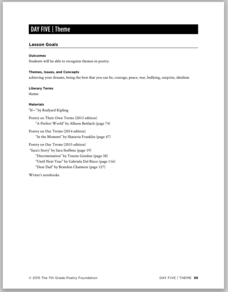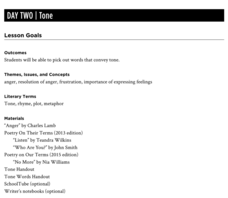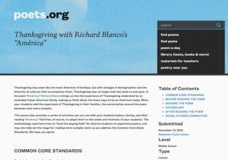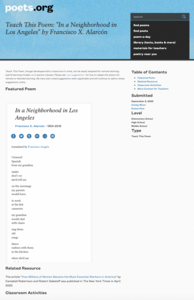Curated OER
Theme
A study of Rudyard Kipling's poem, "If," launches a lesson about theme. Class members read Kipling's poem and poems by other seventh graders to identify the themes.
Curated OER
Revision
Young poets learn the value of using a thesaurus when crafting and revising poems. They examine poems rich in figurative language and then a revised version with the figurative language removed. To demonstrate what they have learned,...
Curated OER
Tone
Identifying the tone in a piece of writing can be tricky. Readers don't have the advantage of studying the images and colors used in a painting or the instruments and sounds of a song. The second lesson in this poetry unit teaches tweens...
Curated OER
What Is Poetry?
The first lesson of 12 in a poetry unit asks class members to develop their own definition of poetry. After crafting a response, they examine a variety of examples and decide if the resources are or are not poems.
Academy of American Poets
Thanksgiving with Richard Blanco's "América"
Traditions, like the times, are a-changin'. Middle schoolers conduct a close reading of Richard Blanco's poem "América" and consider how Blanco's family approached his suggestions for adopting a new approach to their Thanksgiving meal.
Penguin Books
A Guide to the Works of Jacqueline Woodson
The works of Jacqueline Woodson introduce readers to diverse characters and themes. A guide covers many of the author's best-known books such as Brown Girl Dreaming and Locomotion. Dive & Discuss and Explore & Extend activities...
Core Knowledge Foundation
Unit 8: Code Talker by Joseph Bruchac Teacher Guide
Joseph Bruchac's Code Talker tells the remarkable story of Navajo Marines' role in battles of the Pacific Theater during World War II. As scholars read the novel, they also engage in activities that expand their knowledge of Navajo...
Core Knowledge Foundation
Unit 7: Anne Frank’s Tales from the Secret Annex Teacher Guide
Frequently banned, often challenged, a mainstay of middle school curriculum, Tales from the Secret Annex, is the featured text in the seventh unit in the Teacher Guide Core Knowledge Program. The 134-page guide includes an...
Core Knowledge Foundation
Unit 6: The Genius of the Harlem Renaissance Teacher Guide
Introduce your seventh graders to the Harlem Renaissance with a unit that explores this dynamic period's music, literature, and ideas. The 160-page guide includes a unit calendar, an introduction to the unit, 10 richly detailed lessons...
Core Knowledge Foundation
Unit 5: Realms of Gold - Vol. 2 Poetry and Short Stories Teacher Guide
Seventh graders have a golden opportunity to learn how to read poems and short stories with a unit that introduces them to the techniques writers use to craft their works. They examine poems by William Carlos Williams and Edgar Allen Poe...
Core Knowledge Foundation
Unit 4: The Time Machine by H. G. Wells Teacher Guide
Lead your readers into the fourth dimension as time travelers with a Core Knowledge Language Arts (CKLA) Teacher Guide of H. G. Wells's The Time Machine. The 144-page guide includes a unit calendar, introduction, nine lessons, teacher...
Core Knowledge Foundation
Unit 2: The Tempest by William Shakespeare Teacher Guide
Massive storms, shipwrecks, survivors stranded on an island ruled by an aging magician, and strange creatures—Shakespeare's The Tempest appeals to today's middle schoolers. For this unit, seventh graders read selections from an...
Core Knowledge Foundation
Unit 1: Hello, Universe by Erin Entrada Kelly Teacher Guide
Erin Entrada Kelly's award-winning novel, Hello, Universe is the anchor text in this 236-page teacher guide. The guide includes introductions to the Core Knowledge Language Arts (CKLA) program and the unit, a unit...
Academy of American Poets
Teach This Poem: "In a Neighborhood in Los Angeles" by Francisco X. Alarcón
After sketching an essential person and reading an article, scholars read the poem "In a Neighborhood in Los Angeles" by Francisco X. Alarcón. They listen to the poem in English and Spanish and record lines that stand out to them. Small...
Academy of American Poets
Teach This Poem: "November 2: Día De Los Muertos" By Alberto Ríos
Scholars examine a colorful and detailed picture, then view an engaging video in preparation for reading the poem "November 2: Día De Los Muertos" by Alberto Ríos. Learners discuss their observations, feelings conveyed, and the...
Academy of American Poets
Teach This Poem: "The Teller of Tales" by Gabriela Mistral
The poem "The Teller of Tales" by Gabriela Mistral is the subject of a thoughtful instructional activity that allows scholars to listen to or read the poem, then discuss its meaning.
Penguin Books
Educator's Guide: The Da Vinci Code by Dan Brown
Dan Brown's The Da Vinci Code is filled with secrets. Help readers find the clues, solve the riddles and puzzles, and unwrap the mysteries with a six-page guide that includes before, during, and after reading discussion questions and...
Academy of American Poets
Teach This Poem: "On Being Brought from Africa to America" by Phillis Wheatley
Phillis Wheatley's poem, "On Being Brought from Africa to America" is the focus of a lesson that asks readers to consider how the poem is a critique of slavery. Groups comprise a list of words and phrases they notice as well as questions...
Academy of American Poets
The African American Experience
Disrespect can be as subtle as a frown or a turn of a head. To prepare for a study of Toi Derricote's poem "The Weakness" class members create wordless skits that demonstrate subtle or not so subtle signs of disrespect. After a...
National Endowment for the Humanities
Theme Analysis in A Christmas Carol
Why does Charles Dickens have Ebenezer go from scrooge to light-hearted and generous? From "Bah, humbug!" to "God Bless Us, Every One!" After rereading Dickens' preface to A Christmas Carol, learners analyze quotations from the tale that...
National Endowment for the Humanities
Scrooge as He is Revealed during the Ghostly Experiences
Readers learn how to use both direct and indirect characterization clues provided by Charles Dickens to understand the complexity of Ebenezer Scrooge's character. Scholars collect evidence of comments Scrooge hears, how he responds to...
National Endowment for the Humanities
Language Analysis Based on Stave 1
Class members meet the original scrooge, the Dickens character whose name has become synonymous with a cold-hearted, tight-fisted, miser. Using the provided worksheet, readers closely examine context clues to determine the meanings of...
EngageNY
Poetry Analysis: Small Group Practice
Howdy partner! After discussion and teacher model reading of Slaveships, scholars pair up for a partner reading of the poem. They then use equity sticks to discuss their thoughts of the poem with the class. Readers talk about allusion,...
EngageNY
What Gives Stories Their Power?
Read to me! Scholars get lost in a picture book read aloud of The People Could Fly. They discuss text-dependent questions and talk with partners about the meaning of the story. They then study an image in the book to determine the power...

























